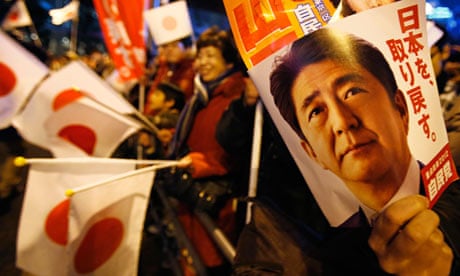Voters in Japan have gone to the polls in an election that is expected to return the country's biggest conservative party to office, three years after its postwar monopoly on power came to a dramatic end.
TV networks will release forecasts of the result after polling stations close at 8pm local time (11am GMT) on Sunday. Opinion polls taken in the runup to the election indicated that the Liberal Democratic party (LDP) would secure a majority in the 480-seat lower house.
Turnout was sluggish at just over 27% by mid-afternoon, down 7.8 percentage points from 2009, according to government data.
If the forecasts are correct, the LDP leader, Shinzo Abe, will become Japan's seventh prime minister in just over six years. An 11th-hour plea to voters by the prime minister, Yoshihiko Noda, to turn their backs on the LDP's "old-style politics" was unlikely to save his Democratic party of Japan (DPJ) from a crushing defeat.
Some polls suggest the LDP, along with its traditional ally, New Komeito, could even secure two-thirds of seats in the lower house – giving it the "supermajority" it needs to overcome a policy deadlock that has blighted successive governments since 2007.
The LDP, which governed for all but 11 months between 1955 and 2009, has capitalised on popular anger over the DPJ government's failure to deliver on a promise to replace pork-barrel politics with a new focus on families, welfare and healthcare.
Many voters feel the DPJ has dawdled over the reconstruction of the region devastated by last year's earthquake and tsunami. And they associate Noda with an unpopular plan to double the consumption (sales) tax to 10%, a measure that passed only with the support of Abe's party.
But there was little enthusiasm outside polling stations for the LDP and Abe, the grandson of a former prime minister who holds revisionist views on Japan's wartime conduct and supports a more active overseas role for Japan's armed forces.
Instead, uncertainty over the economy and Japan's response to the rise of China appears to have sent voters reaching for the familiar – big spending on public works to boost growth, and close security ties with the US to counter the perceived threat from China.
"The Democrats are out because they have been unable to implement their policy manifesto and are divided internally. But that doesn't mean I support the LDP," said Yosuke Matsumoto, a 33-year-old voter. "Nothing will change under them."
Koichi Nakano, a political science professor at Sophia University, said the election was about "punishing" the DPJ, which won by a landslide in 2009. "It seems to me that people are driven by nostalgia, as they seem to want to bring the LDP back to power because they lack better alternatives," he told Reuters.
Voters, many of whom said they were undecided going into Sunday's election, have no fewer than 12 parties to choose from.
Most are unlikely to have an impact on the outcome, but one possible exception is the Japan Restoration party, a far-right group led by the outspoken former governor of Tokyo, Shintaro Ishihara.
His party has placed second in some polls and could force Abe into coalition talks in the event of a hung parliament.
Abe, 58, whose first stint as prime minister ended in 2007 amid scandal and ill health, has pledged to take a tougher stance on the Senkaku territorial row with Beijing, and to abandon plans to phase out nuclear power by 2040 – a measure the DPJ introduced in response to the Fukushima Daiichi nuclear accident.
Of the 480 seats in Japan's lower house, 300 are elected from single-seat districts and the remaining 180 through proportional representation in 11 regional blocks.





